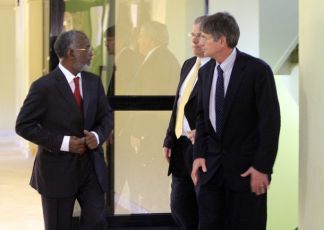Sudan welcomes U.S. steps to remove it from terror list, calls for broader engagement
February 9, 2011 (KHARTOUM) – Sudan has welcomed the steps taken by the U.S. Administration to remove its name from the list of terrorism-sponsoring countries, calling for more efforts to waive economic sanctions and relieve its external debt.

Sudan’s foreign minister Ali Karti Tuesday held a meeting in Khartoum with the U.S. Special Envoy to Sudan, Scott Gration, and welcomed the process.
Sudan has been branded by Washington as a state sponsor of terrorism since 1993 in connection to its sheltering of trans-national hard-line Islamists, including Al-Qaidah leader, Osama Bin Laden.
However, the Sudanese government shifted shape and engaged in counterterrorism cooperation with the CIA following the 1999’s schism in its ranks between supporters of President Al-Bashir and those of veteran Islamist leader Hassan Al-Turabi.
During the meeting, Ali Karti called for lifting U.S. economic sanctions on Sudan and exerting efforts to relieve Sudan of its external debts, which currently stands at 37m U.S. dollars according to official figures.
Sudan has long complained that the political will of the U.S. administration is standing in the way of the country’s efforts to rally support for relieving its external debts.
For his part, the U.S. envoy confirmed that his country was in the process of removing Sudan from the terror list, saying that it would take up to six months to complete the process.
Sudanese and U.S. diplomats recently exchanged visits and announced that the two sides had agreed on a road map to normalize bilateral relations.
Sudan has been under U.S. economic sanctions since 1997 over alleged support of terrorism and later over the conflict in the Western region of Darfur.
Washington offered Khartoum a removal of the terrorism list if it fully implements the Comprehensive Peace Agreement brokered by the George W. Bush’s U.S. administration in 2005 to end more than two decades of civil war between North and South Sudan.
Sudan last month successfully conducted the most important stipulation of the CPA, which the referendum on south Sudan independence whose outcome was massively in favor of secession from the North.
However, U.S. officials said that waiving economic sanctions on Sudan is contingent on resolving the situation in Darfur, where nearly 300,000 people have died and more than 2 million have been forced from their homes since the conflict between the government and ethnic rebel groups in 2003, according to UN figures.
Concurrently in Khartoum, the political secretary of the ruling National Congress Party (NCP) Ibrahim Gandur issued a statement in which he criticized the U.S. administration for keeping Sudan’s name on the terror sponsoring list, saying it was “a political decision” that had “nothing to do with human rights.”
The NCP official said that the country had a clear strategy on Darfur as delineated in the proposal of the Darfuri-Darfuri dialogue.
(ST)

Janafil
Sudan welcomes U.S steps to remove it from terror list, calls for broader engagement
put in mind that if Sudan is remove later from the terrorist list it will be welcome but Umar el Bashir will remain with ICC.